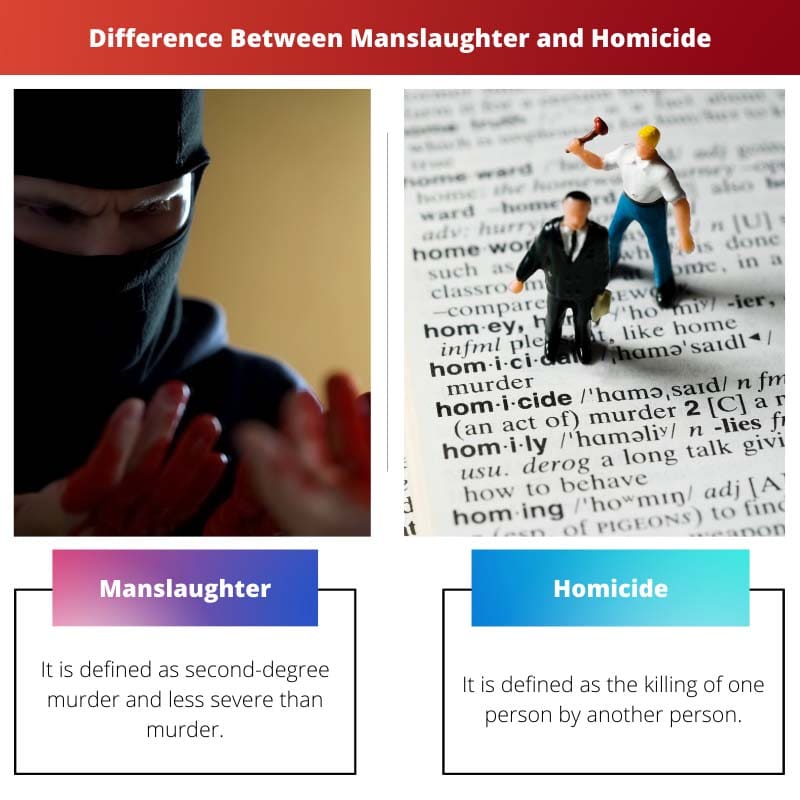Killing is not every time associated with bad intentions. Sometimes it is done without the person knowing what he is doing, without having any bad intentions. Similarly, sometimes, it is possible that it can result from an emotional response or situation.
Manslaughter and Homicide are such kinds of crimes which, although they involve taking one’s life, the intention is not to kill them. They are interchangeably used, but there are certain differences.
Key Takeaways
- Manslaughter is the killing of another person without malice or premeditation.
- Homicide is a broader term that refers to any killing of another person, whether intentional or unintentional.
- Manslaughter is considered a less serious crime than homicide.
Manslaughter vs Homicide
Manslaughter is a legal term used to describe the unlawful killing of another person without malice aforethought, which means that the killing was not premeditated or intentional. Homicide is a broader legal term used to describe the killing of another person, regardless of whether it is lawful or unlawful. Homicide includes both murder and manslaughter, as well as other types of killing.

Manslaughter is a criminal homicide that is done unintentionally. It is a second-degree murder that can have up to 11 years of penalty. Manslaughter is of two types Voluntary and Involuntary.
Voluntary manslaughter is done in the heat of passion or when one is provoked by another. Involuntary manslaughter happens due to some wrong actions of the accused.
Homicide is the simple killing of one person by another without any such intention of killing them. It can be illegal or legal both. They are excusable and justifiable.
For example, a person can kill another person to save anyone or save themselves. Then that will not suffer any penalties. But it is needed to prove that there was no intention of killing and just for saving.
Comparison Table
| Parameters of Comparison | Manslaughter | Homicide |
|---|---|---|
| Definition | It is defined as second-degree murder and less severe than murder. | It is defined as the killing of one person by another person. |
| Law | It is an unlawful killing of another person. | It can be legal and illegal. |
| Intention | It involves no such intention of killing people, and the intent is irrelevant as a result of an intense emotional response. | It involves no intention of killing the person, and it is done if it just has to. |
| Outcome | It is like criminal homicide and can have severe consequences but less than murder. | Unless they are not criminal homicides, they are justifiable and excusable. |
| Examples | Examples such as a doctor giving medicine to a patient, which results in the death of the patient without being intended by the doctor. | Examples such as soldiers in a battle killing people, which is not a crime and has no intentions. |
What is Manslaughter?
Manslaughter is the killing of another person, which is illegal, but it is done without any intention to do so. It can be an emotional response or in the heat of the moment. It is also known as second-degree murder and criminal homicide. It means that it is less brutal than murder and more brutal than homicide.
In this, a person can have very serious consequences, but if you prove your point, it will be less than murder. There are two types of Manslaughter – one is Voluntary, and another is Involuntary.
Voluntary manslaughter means when someone kills another person, but it is done when provoked by the other one or just in the heat of passion. One can get a penalty of up to 11 years in prison.
Involuntary manslaughter means the death is unintentional, and it is done as a result of one’s action. The penalties of this type can be up to 4 years of prison.
Suppose a person can be charged with manslaughter when there is a shortage of evidence. A murder can be turned into manslaughter to reduce the penalties.

What is Homicide?
Homicide is simply defined as when one person kills another person. It can be legal or illegal. There are different types of homicide, such as first-degree homicide, second-degree homicide, and justifiable homicide.
First-degree homicides are murders that are done with malicious thoughts, and the person wants to kill another person. It is very brutal, and the accused can get a life imprisonment sentence for this crime. It is an illegal and unjustified killing.
Second-degree murder is Manslaughter which is a criminal homicide and less brutal than murder. It is not done with malicious intention and can have less severe consequences. It is done when the accused is provoked and in the heat of passion or the accused did some wrong actions.
Justifiable homicides are not brutal because the reason for killing someone is justified and right. If someone killed another person with the intention of self-defence, then it is justifiable and excusable.

Main Differences Between Manslaughter and Homicide
- A manslaughter is an unlawful act of killing, whereas Homicide can be legal or illegal.
- Manslaughter can result in severe consequences, but less than murder, whereas Homicide is justifiable and excusable.
- Manslaughter is second-degree murder and less brutal than murder, whereas Homicide is not brutal as Manslaughter.
- Manslaughter is done in the heat of the situation or upon provocation, whereas Homicide is killing anyone in self-defence.
- An example of Manslaughter is reckless driving, whereas an example of homicide is when the police kill a suspect.

- https://heinonline.org/hol-cgi-bin/get_pdf.cgi?handle=hein.journals/emlj50§ion=22
- https://www.bmj.com/content/321/7270/1212.short

The definitions provided here are very accurate and well-explained. It’s crucial to distinguish manslaughter from homicide, as they can have different legal consequences.
I completely agree. It’s important to understand the legal implications and the nuances that differentiate these two terms.
The detailed breakdown of voluntary and involuntary manslaughter, along with the distinctions between manslaughter and homicide, is quite informative and educative.
I agree. The comparison table here is particularly helpful in understanding the differences between manslaughter and homicide.
Absolutely. I appreciate the comprehensive nature of the explanations provided in this article.
This article effectively explains the legal definitions of manslaughter and homicide, and how they differ in terms of intention and consequences.
Yes, the comparison table and examples provided give a clear picture of the differences between manslaughter and homicide.
The article offers a comprehensive comparison between manslaughter and homicide, adding clarity to their legal definitions and implications.
Absolutely. I found the examples provided to be particularly helpful in understanding the distinctions between these terms.
This article helps clarify the subtle differences between manslaughter and homicide, providing comprehensive information about each term and their legal implications.
Indeed, the comparisons made here effectively highlight the distinctions between these legal terms.
Absolutely, and it’s interesting to understand how an unintentional death can lead to manslaughter, while homicide is not always a criminal act.
The distinctions between manslaughter and homicide are clearly outlined here, especially when it comes to the legal outcomes and implications.
I completely agree. This article provides an in-depth understanding of how the law perceives these two types of killing.
Yes, it’s crucial to comprehend the nuances between manslaughter and homicide, and this article does an excellent job of explaining that.
The in-depth analysis provided here is very informative, especially the breakdown of voluntary and involuntary manslaughter. It really helps in understanding the legal ramifications.
I couldn’t agree more. The way this article discusses the legal and emotional aspects of manslaughter is truly enlightening.
The way this article compares and contrasts manslaughter and homicide, focusing on their definitions, implications, & examples, is truly commendable.
Indeed, the detailed information provided here is quite helpful in understanding the differences between manslaughter and homicide within a legal context.
I couldn’t agree more. The legal nuances between manslaughter and homicide are effectively highlighted in this article.
The detailed explanations of voluntary and involuntary manslaughter, as well as the differences between homicide and manslaughter, are presented very clearly in this article.
Absolutely, and the real-life examples provided truly illustrate these legal concepts.
I’m impressed with how this article delves into the legal intricacies of manslaughter and homicide. It’s quite enlightening.
This article provides a thorough explanation of manslaughter and homicide, shedding light on the legal aspects and differences between these terms.
Indeed, the article effectively navigates through these legal concepts, offering a deeper understanding of manslaughter and homicide.